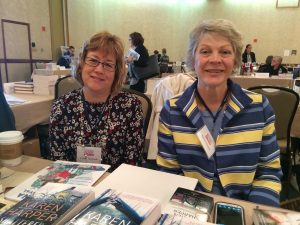
Yesterday I enjoyed appearing at the Ohioana Book Festival in Columbus, Ohio, a festival I’ve appeared at for several years now. It’s a great time to meet new readers, reconnect with those who have read my books, and mingle with other authors, bookstore owners, librarians, and book lovers. This year I was asked to be on a panel with other authors who have published both traditionally and independently. There was a lot of discussion, but there were a few things that didn’t get said.
If you are AN AUTHOR WHO WANTS SOME ADVICE ABOUT THE PROCESS, this post is for you!
[bctt tweet=”What I Wish I’d Said about Self-publishing at the book festival panel. #indiepublishing #selfpublishing” username=”cindyswriting”]
1. Don’t Rush to Publication

I get it. It’s discouraging when you learn how long a publisher takes to get a book out. You just want your book to be launched to the world, and you don’t want it to take sooooo loooong! While doing it yourself will most likely get your book to the marketplace quicker than a traditional publisher would, don’t rush the process. Take the time needed to polish your book, to send it to critique partners and early readers, to get it to an editor, to make changes, to perfect the book cover and title, to get some reviews and endorsements prior to publishing, and to create some pre-publication buzz. You will also need time to review proof copies, make any necessary changes, and wait for the first copies to be printed and shipped to you.
I don’t know how many times I’ve heard a self-published author say something like, “I need to get my next book out by September and it’s already July and I only have half of it written.” No, no, no! Stop it! That’s just not enough time to do all the things I’ve listed above. Remember, you are in charge. Not having a deadline forced on you is one of the advantages of doing it yourself. No one is insisting you have your book out by a certain date. You may be shooting for something like launching it at a book festival or getting it out before you have knee surgery, but plan for that way in advance. Rushing never produces anything good. I’m sure your parents told you that when you were younger. That advice never goes out of style.
2. Carefully Consider the Title and Cover

Get second opinions, lots of them. I have seen (I’m sure you have too) many terrible covers done by indie authors on their own computers. The fact is, we do judge books by their covers. If you are not an accomplished artist, don’t do it. You don’t want to risk having your cover show up on one of these sites. There are stock images sites, and photo sharing sites where you can get images for low cost or for free that are high resolution. For print books your image must be high resolution. But even if you use a quality image, choosing the best font type, size, and color requires a practiced eye. You may think you know what looks good, but obviously many people are getting it wrong. You will also need to consider how it will look online as a thumbnail and how the spine will look. The genre of your book should be considered. Look at others that sell well and study them.
I worked with an artist and saved money by bartering some writing services. I have gotten many compliments on my covers. Most people don’t realize that this cover:

was not created by the publisher who did these two


The most important thing I wish I’d had time to talk about….
3. Get a Professional Editor
During the panel discussion it was mentioned that you’d need to either hire someone or get friends who are really good at it to edit your manuscript. No, no, no! Stop it! Please don’t think your friends, even avid readers and college professors, can edit your books. They may make it better and serve a valuable role in the process, but you need to finish with a pro in order to produce a professional product, one in which the reader doesn’t even notice the editing. Yes, that costs money. Again, planning ahead is critical. Having had some wonderful editors with my traditional books, I knew how valuable that process is. You do need to pay people for the work they do for you. Save your money. Do some freelance magazine writing, take on an extra job, Some people are using crowd funding. I did a little of that with Sofia’s Tune (thank you, contributors!) For my next book I won a grant I applied for to pay for one of the best editors out there.

Anything less than a professional editor will result in a book that is less than it could have been. Who wants that? Even if your book is free from typos and grammatical errors, an editor will have feedback about flow, about the organization, clarity, and word choice. Once you’ve worked with a professional editor, you will understand that a good editor will make you look smarter, and just generally help you be a better writer than you ever thought you could be. Don’t skip it. Don’t skimp. Just don’t.
But here’s an advantage you will have by publishing on your own. You will most likely use a publishing platform like Create Space. Your print books will be print on demand. If you find a mistake you can temporary take that title down, fix the mistakes, and re-post it. Your changes can also be made to your ebooks. By not having thousands printed like a traditional publisher would do, you will not have thousands of books with your name out there with errors.
I should say a word here about copy editors. If you don’t know the difference between a copy editor and a substantive editor, that’s enough to tell you you need a pro. I had a great edit for Sofia’s Tune. I put the book out there. And then I kept finding typos and misspellings that we’d both missed. Not the editor’s fault. She was not doing a copy edit. I happen to have a friend named John who is great at finding those things. He even found mistakes when I was re-publishing a traditionally published book that went out of print that the original editors had not caught. John now goes over all my self-published books at the very end, right before I send them to a formatter (which is another service I hired out. Not expensive and so worth it since ebooks and print books have to be formatted differently.) Try as you might, you WILL miss things in your manuscript. So will your mother and best friend (unless John is your best friend.) Trust me on this.
So Now I Said It
Those are the things I wish I’d said to the room full of writers who came to the panel. They might not read it here, but just in case, I wanted to try. And I hope others stop by to learn a little of what I’ve learned along the way. (And I’m still learning!) Let me know if you have any questions!

Great advice here Cindy. Wish there was a share button! Going to send traditionally via e-mail to my nephew.
Thanks for sharing, Kathy!